Current postgraduate students
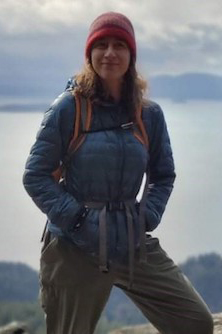 Pearl Barry
Pearl Barry
My interests in ecology are broad in terms of species and habitats. I have experience monitoring and evaluating behaviour of Western American migratory songbirds, beavers in the Elwha River restoration sites, and indicator species such as northern goshawks in the Sierra Nevadas.
I am interested in keystone species effects, ecosystem restoration, and endangered species/ecosystems, and how a better understanding of animal behaviour can inform management decisions/aid restoration efforts.
My MSc aims to critically assess the ecology, behaviour, and habitat use of wild and translocated populations of Eastern Otago green skinks (Oligosoma aff. chloronoton) and quantify translocation success for captive populations in Mokomoko Dryland Sanctuary.
Course: Master of Science (MSc)
Supervisor: Jo Monks (Zoology)
Email barpe512@student.otago.ac.nz
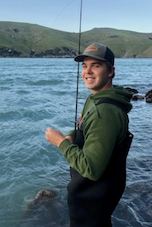 Finn Brittenden
Finn Brittenden
Predator Free 2050 is Aotearoa’s ‘moon-shot’ biodiversity mission to rid the Motu of introduced mammalian predators, and in the process allow our threatened biodiversity to recover and flourish. However, not all introduced predators are included as target species, such as mice which are left out as they have been deemed impossible to eradicate.
My research will focus on the potential impacts the ‘release’ of mice may have on our invertebrate community, specifically changes in the functional group structure.
Course: Master of Science (MSc)
Supervisor: Jo Monks (Zoology)
Email brifi122@student.otago.ac.nz
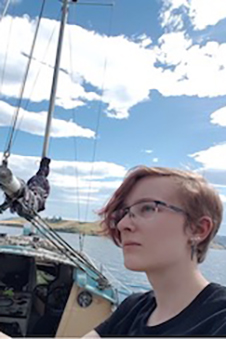 Adair Clark
Adair Clark
My MSc research is in phytoplankton and how they may respond to future environmental changes including marine heatwaves and proposed deliberate attempts to increase ocean pH (Ocean Alkalinity Enhancement). The research includes elements of marine science, chemistry, and botany.
I am interested in the underlying systems that control and connect the living world, and in the ways we have to work with them to combat modern challenges, which is why I study Ecology.
Course: Master of Science (MSc)
Supervisor: Linn Hoffman (Botany))
Email claad298@student.otago.ac.nz
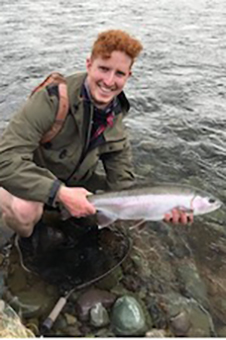 Benjamin Davies
Benjamin Davies
My main interests revolve around freshwater and marine environments, and I’m a keen recreational fisher and diver.
My research topic for my post-graduate diploma will be the distribution and population dynamics of the Central Otago roundhead galaxias (Galaxias anomalous). G. anomalous is somewhat unique in the world of non-migratory galaxiids in that it appears to be able to coexist, to a degree, with introduced predators such as brown trout. However, there are several unknowns regarding this apparent coexistence which I will begin exploring through a review of current literature and the NZ Freshwater Fish Database.
Course: Postgraduate Diploma in Science (PGDipSci)
Supervisor: Gerry Closs (Zoology)
Email davbe572@student.otago.ac.nz
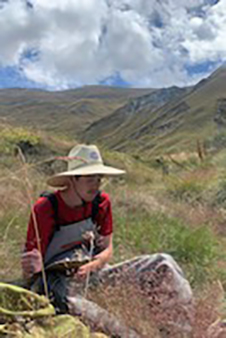 Isaac Davies
Isaac Davies
My whole life I have been interested and passionate about New Zealand’s freshwater environments, especially our native fish species.
My research will focus on the habitat and distribution, the interaction with introduced fish species, and the larval processes and spread of some our most threatened native galaxiid species.
I hope that this research will aid in the conservation and management of these fascinating native species.
Course: Master of Science (MSc)
Supervisor: Gerry Closs (Zoology)
Email davis332@student.otago.ac.nz
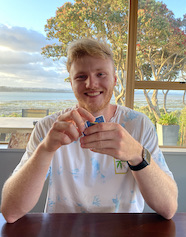 Lachie Davidge
Lachie Davidge
My research interests are in herpetology and ornithology; however, I hope to study or work on wolf behaviour and conservation sometime in the future.
I prefer more applied ecology as it keeps me outdoors, active, and allows me to see the animals I love in their natural habitats.
In my free time, I enjoy hiking, photography, snowboarding and weightlifting.
Course: Master of Science (MSc)
Supervisor: Jo Monks (Zoology)
Email davla144@student.otago.ac.nz
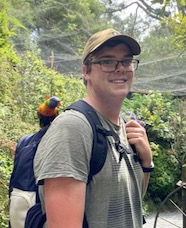 Corey Denham
Corey Denham
My MSc in Ecology will focus on the diversity of freshwater invertebrate communities on Stewart Island. I am particularly interested in the Theory of Island Biogeography, and using it to investigate how the species composition of invertebrate communities have changed since Stewart Island's isolation.
Course: Master of Science (MSc)
Supervisor: Gerry Closs (Zoology)
Email denco453@student.otago.ac.nz
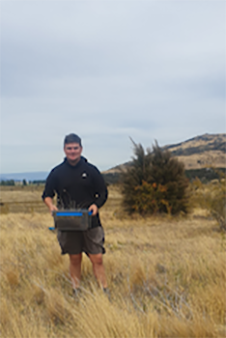 Taylor Duff
Taylor Duff
My research will focus on how a combination of native and exotic grasses as well as an exotic herb, affect the weight gain in larvae of the Cromwell Chaffer Beetle.
Being from Dunedin, I have a close connection to Central Otago, and I am grateful to be given the opportunity to aid in the conservation and hopefully translocation of this rare beetle.
Course: Postgraduate Diploma in Science (PGDipSci)
Supervisor: Jenny Jandt (Zoology), Barbara Barratt (AgResearch)
Email dufta134@student.otago.ac.nz
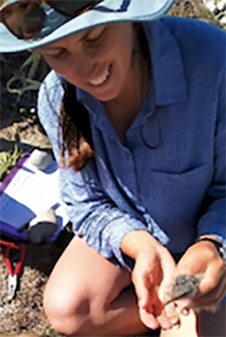 Katie Gray
Katie Gray
I’m an ecologist with a passion for wildlife conservation. I’m currently researching how black-fronted terns (Chlidonias albostriatus) and banded dotterels (Charadrius bicinctus) use threatened glacial outwash plain habitats in the Mackenzie Basin. The information from my study will support DOC to develop site specific management plans for these areas.
My work is focused on the birds’ movements, habitat use, nesting distribution, breeding success and causes of nest failure.
Course: Master of Science (MSc)
Supervisor: Jo Monks (Zoology), Yolanda van Heezik (Zoology), Richard Maloney ( DOC )
Email graka585@student.otago.ac.nz
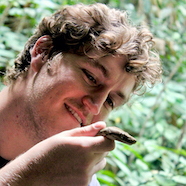 Liam Ireland
Liam Ireland
New Zealand's native frog species are cryptic, with little known about them. My masters looks at the specifically the movements and dispersal ability of Hochstetter's frog (Leiopelma hochstetteri) using new techniques of marking and tracking. I aim to study at the movements of frogs in relation to habitat structure and weather as well as developing ways of following their movements and identifying them in the field.
Course: Master of Science (MSc)
Supervisors: Christoph Matthaei (Zoology), Stephanie Godfrey (Zoology), Jennifer Germano (DOC)
Email ireli721@student.otago.ac.nz
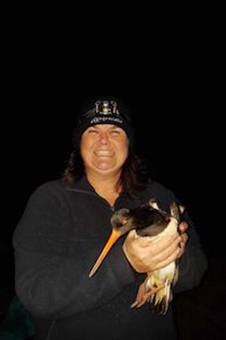 Ange Knight
Ange Knight
Wildlife conservation and ecology is the broad umbrella describing my research interests. My MSc looks at the interaction of the predatory behaviour of domestic cats and selective predator control (such as for Predator Free 2050) in an urban environment.
I am also analysing three years of monitoring data to ascertain effects of urban predator control on the relative abundance of introduced mammalian predators. I also hope to work on and/or research the conservation of wild fields somewhere in the world someday.
Course: Master of Science (MSc)
Supervisors: Yolanda van Heezik (Zoology)
Email knian050@student.otago.ac.nz
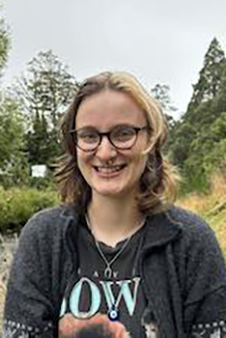 Jasmine Lane
Jasmine Lane
My MSc in Ecology will focus on distribution and population structure of giant kōkopu within the Otago and Southland area. I will also factor in where these populations tend to reproduce, either freshwater (non-diadromous) or saltwater (diadromous).
My aim is to get a better understanding of population dynamics, and to assess where recruitment of new fish into these populations is limited. I hope to contribute to the management and conservation of native fish populations through my research.
Course: Master of Science (MSc)
Supervisors: Gerry Closs (Zoology)
Email lanja724@student.otago.ac.nz
Alexandra Rivera Luzunaris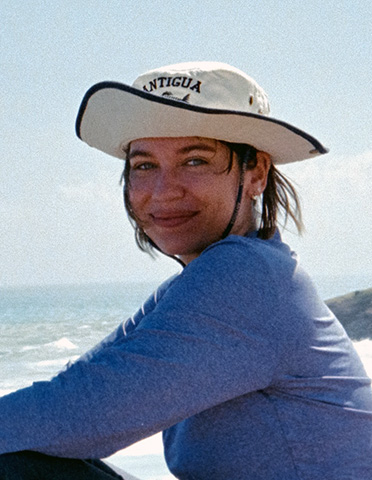
Ever since I was young, I have had an interest in understanding our natural resources and the different relationships that occur in them.
During the recent past, I had the opportunity of working with tropical herpetofauna, which launched my desire to pursue graduate studies.
My research will mainly focus on the introduced brown tree frog (Litoria ewingii), its spatial distribution in the alpine South Westland, and how they may affect resource and habitat competition with the native cascade gecko (Mokopirirakau “Cascades”).
Course: Master of Science (MSc)
Supervisor: Jo Monks (Zoology)
Email rival913@student.otago.ac.nz
Harvey Rubbo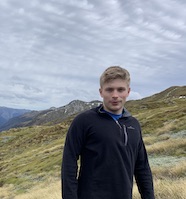
My research will focus on how introduced salmonids impact multiple species of native galaxiids on the West Coast.
I am motivated to study this topic because both groups of fish provide culturally and economically significant fisheries to the West Coast, and their ecology is not well understood compared to in neighbouring Canterbury and Otago.
Course: Master of Science (MSc)
Supervisor: Gerry Closs (Zoology)
Email rubha655@student.otago.ac.nz
 Jacqueline Theis
Jacqueline Theis
I am not only an invertebrate enthusiast, but most importantly, I am deeply passionate about urban ecology and the many ways in which we can boost biodiversity in the city. While urban landscapes are built for us humans, we tend to forget that urban landscapes are highly heterogenous patches of natural and anthropogenic origin, which can accommodate viable flora and fauna habitat, if done right.
My project will focus on the creation of an ecologically valuable tool that is reliably indicative of individual buildings and neighborhood biodiversity.
The goal is for the tool to be used to rate current and potential biodiversity enhancement values of residential and public-built infrastructure. Further, I will explore the biodiversity value of green installations, such as planters, in the city matrix by sampling the diversity of both plants and invertebrates inhabiting these green installations.
Course: Master of Science (MSc)
Supervisors: Yolanda van Heezik (Zoology), Phil Seddon (Zoology), Barbara Barratt (AgResearch)
Email theja822@student.otago.ac.nz
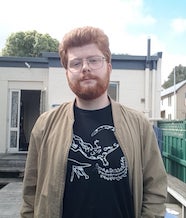 Elliot Weir
Elliot Weir
I love our native reptiles and am interested in better understanding their role in our ecosystems, particularly their roles in plant reproduction. There is very little research on their roles as pollinators; in fact, no one has actually proven they do pollinate any plants.
They are also important seed dispersers, and I am interested in how this differs across different plant species, different gecko species, and even different conservation programs.
Course: Master of Science (MSc)
Supervisor: Steph Godfrey (Zoology)
Email weiel721@student.otago.ac.nz
Maddy Whitaker
Right since I was a child, I have been fascinated by wildlife around me and have had a strong drive to protect it. I've had the privilege of being able to work on a number of offshore southern islands assisting with predator control, and to work hands on with a number of New Zealand bird species, including kākāpō, kea, rock wren, hoiho and takahe.
For my MSc, I am using GPS telemetry to map the space use of breeding female kākāpō and their offspring. This project will help us to further understand the habitat requirements of breeding females, and how this changes between nesting, chick rearing and post fledging periods, as well as any key differences between supplementary fed females and non supplementary fed females. I look forward to this unique opportunity to carry out this study part time, alongside my full time role of a kākāpō ranger.
Course: Master of Science (MSc)
Supervisor: Jo Monks (Zoology)
Email whima703@student.otago.ac.nz
 Yuhan Zhou
Yuhan Zhou
I have always had an interest in algae and marine ecosystems. Marine viruses have been proved to play an important role in the primary production of marine ecosystems. Research on marine viruses, although still a relatively new field, has accumulated a considerable amount of literature so far. Unfortunately, such studies are sorely lacking in the Southern Ocean, particularly in the waters around New Zealand.
One fact is that there is still a great deal of groundwork to be advanced in ecological research at the moment. I also believe that as a preparatory scientific researcher I need to take some responsibility.
My Masters project aims to first isolate and identify viruses that may currently be present in the waters around New Zealand, and then further understand their impact on the survival and reproduction of phytoplankton, such as Coccolithophores.
Course: Master of Science (MSc)
Supervisor: Linn Hoffmann (Botany), Paul Guy (Botany)
Email zhoyu285@student.otago.ac.nz
Completed postgraduate students
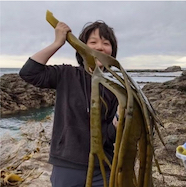 Pluto Liu
Pluto Liu
I studied the biogeography of Antarctic terrestrial species using population genetic/genomic methods and GIS spatial analysis, in order to infer the long-term distribution, survival and evolution of those species. I looked at their distribution patterns across Antarctica and the relationship with environmental factors, especially temperature and ice cover (<0.5 per cent of Antarctica is free of ice, but those species have survived millions of years!).
Course: Bachelor of Science with Honours (BSc (Hons))
Supervisors: Ceridwen Fraser (Marine Science), Fraser Morgan (Manaaki Whenua – Landcare Research)
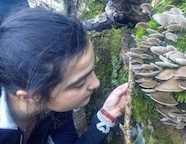 Shar Mathias
Shar Mathias
I am fascinated by ecosystem-wide interactions and their relevance to conservation, and love learning about intricate connections between species. I particularly enjoy big data and using R to analyse datasets.
My research aimed to get a better picture of the underlying factors driving beech tree (Nothofagus spp.) distributions in New Zealand and how climate change will affect this. Forests and alpine regions are some of my favourite ecosystems.
Course: Bachelor of Science with Honours (BSc (Hons))
Supervisors: Matt Larcombe (Botany), Kath Dickinson (Botany)
Jack Mathieson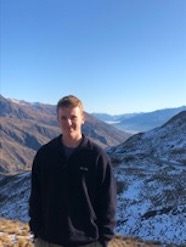
My interests growing up included fishing, swimming, tramping and anything outdoors. This lead me to studying Ecology at the University of Otago. I worked with an aquaculture company called Keewai that has aquaculture ponds of Paranephrops zealandicus (freshwater crayfish) among the unproductive riparian margins of forestry blocks.
This led me to a masters project interested in finding out why some ponds are extremely productive compared to other similar ponds and how we can improve this to boost breeding, growth and survival of not just an ecologically important species but also an important mahika kai species.
Course: Master of Science (MSc)
Supervisors: Gerry Closs (Zoology)
Amirah Norhayati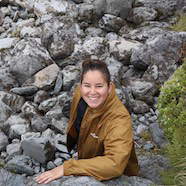
My masters looked at microplastics in New Zealand lakes. I conducted a mesocosm experiment and looked at whether microplastics are transferred through lake food webs and if trophic levels are directly or indirectly affected by microplastics. As well as this, I looked at fish behaviour in response to microplastic exposure.
Course: Master of Science (MSc)
Supervisors: Travis Ingram (Zoology), Christoph Matthaei (Zoology)
Myrene Otis 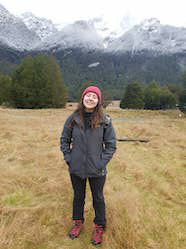
I researched the movement and behaviour of two colonies of Tawaki/Fiordland Crested Penguin (Eudyptes pachyrhynchus) breeding in Milford Sound.
This project investigated the foraging ecology of Tawaki breeding in a fiord ecosystem and assess the significance of behavioural states and environmental variables in determining their foraging patterns.
Course: Master of Science (MSc)
Supervisors: Yolanda van Heezik (Zoology), Phil Seddon (Zoology), Thomas Mattern